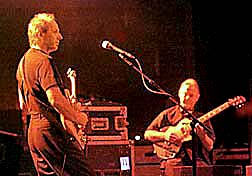
Adrian Belew and Robert Fripp.
Story and Photo by Tony Bonyata
That was originally going to be the entire review of King Crimson's performance in Milwaukee last Thursday. Because to be able to perfectly sum up a performance with just two simple words, especially when it's a strong one, is a rarity.
But considering the tenure and historical importance of a band like Crimson, along with everything that these four accomplished musicians squeezed into, and out of, their performance last week, it seemed a bit unfair not expound a little bit. So...
Supporting their construKction of light album, Robert Fripp (guitarist extraordinaire and founding band member) brought his latest incarnation of King Crimson to the Modjeska Theater filled with predominately 30 to 40-something males. Although Fripp has had a revolving door of musicians come and go throughout Crimson's 31-year career, his latest lineup, featuring guitarist / vocalist and two-decade veteran Adrian Belew, touch bassist Trey Gunn and drummer Pat Mastelotto, is arguably their most stripped down and tightest.
With Fripp seated next to his glowing stack of techno gadgets, the band opened with "Vrooom," an instrumental ogre that chewed up everything in its path. Adrian Belew, with long locks now cut short along with a few healthy pounds added to his once gaunt frame, beamed throughout the show, smiling and nodding to bandmates as he belted out the aptly titled number "Dinosaur." They continued by pulling out a few older favorites such as the haunting "Frame By Frame,"Thela Hun Ginjeet" and crowd favorite "Elephant Talk," all from their 1981 album Discipline. On "Prozac Blues," a stomping, swampy blues number from the construKction of light, Belew's voice morphed into a low, gravely Delta moan, sounding out of character for Crimson, (which may have explained why his voice was so strained when he later performed "Three of a Perfect Pair" alone with just an acoustic guitar.)
Belew's duties as frontman / guitarist were natural and relaxed, seeming more content as just one of the contributing bandmembers than a showboating rockstar. Fripp, on the other hand, seemed almost invisible as he sat in the shadows with his side to the audience, rarely, if ever, glancing at the crowd. And despite the fact that he never directly connected on a physical level with his audience, his guitar playing spoke libraries to them on a cerebral one. From his passive ambient interludes and orchestral passages to his frightfully menacing arrangements and speed-of-light mathematical cacophonies, Fripp's highly unique style left the crowd's jaws agape with amazement.
In any other rock band the singer and guitarist(s) almost always seem to steal the spotlight, but the complex and interlocking rhythms laid down by Gunn and Mastelotto commanded as much attention as Fripp and Belew. Mastelotto's fierce and precise drumming loosened the foundation of the old theater while still managing to work within the constraints of well orchestrated silence. On both the poetic, ambient passages and bone-crushing arrangements, Gunn sensually manipulated his touch guitar (which is played in a similar way to the Chapman Stick, originally mastered by long-time Crimson member Tony Levin.) with a disciplined fluidity.
Despite Belew admitting, somewhat tongue-in-cheek, "I'm a dinosaur, somebody is digging my bones," during the number "Dinosaur," they never really dug too deep into their own massive back catalog. They did, however, manage to resurrect one behemoth of a gem, "Red," from their 1978 album of the same name. They also performed an updated revision of their brilliant and ferocious "Lark's Tongue in Aspic." (this being the fourth revision, in fact, from their latest album.)
While still perceived by many to be a 'progressive rock' band from the '70s, they're more content to forge ahead, taking their music to new places. Pat Mastelotto explained prior to the show, "What's great with Crimson is that there's such a wide open canvas - it's such an exploratory thing. Losers call it 'prog rock', because most of the prog bands sound like they did in 1970. I don't know if Crimson is a prog band because it actually IS progressing. Robert gives you that freedom.
It's been this creative freedom of expression that has kept King Crimson from extinction. Rather than traveling down the same old paths in concert, they instead intertwined a healthy dose of new experimental material, which they refer to as ProjeKcts, into their set. "We've got enough of a repertoire -things from the ProjeKct X, PXX and ProjeKct 3 records," explained Mastelotto, "that we'll always have at least one place to poke something like that in.
Call it prog rock. Call it dinosaur rock. Just make sure you call me when King Crimson have something new to say.